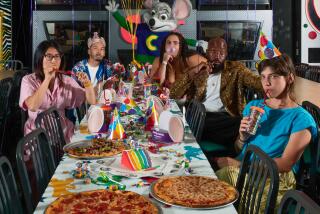Coming of age in TV land
- Share via
There’s a delectable symmetry in the fact that the long-awaited DVDs of “thirtysomething,” that late 1980s paean to yuppie disquietude and silver-tongued solipsism, have unleashed themselves on us just a week after the flurry of excitement surrounding season three of “Mad Men.” I won’t go so far as to say the latter show wouldn’t have been possible without the former (it’s a superior product and very much its own entity), but the programs do have a few eerie commonalities.
For starters, they both traffic in the complicated emotions that arise from the relationship between human beings and advertising (we know we’re being manipulated, but we reach for our wallets nonetheless). For another, they’re steeped in very specific aesthetics signifying very specific milieus. And while the sensibilities in many ways seem diametrically opposed -- “Mad Men,” set in early 1960s New York, plumbs the halcyon days before the countercultural revolution, whereas “thirtysomething,” set in Philly, tracked the fallout from that revolution some three decades later -- they are ultimately about something even more universal than class aspiration and consumer impulse: What it means to be an adult.
“Thirtysomething” featured the Michael and Elliot Co., helmed with Nerf basketball insouciance by leading man Michael Steadman and his best friend. Compared to “Mad Men’s” Madison Avenue firm Sterling Cooper, it’s more lemonade stand than big-time ad agency. But the TV admen then and now (and everyone in their midst) struggle incessantly with the gulf between reality and aspiration, the characters’ actual lives and those they envision for themselves.
Before his responsibilities as a breadwinner steered him to advertising, “thirtysomething’s” Michael aspired to be a fiction writer. His wife, Hope, is a Princeton grad torn between career and child. By the show’s fourth and last season, Michael has abandoned his start-up for the corporate ranks and Hope is on to baby No. 2.
Meanwhile, the show’s other married couple has separated, reunited and moved to L.A., and the assorted single characters have either grabbed or are within spitting distance of the holy grail, marriage. As for the show’s most idealistic character, the longhaired, bicycle-commuting, un-tenured (and unfazed by that) professor, Gary Shepherd: He gets killed off, which made for a cruel little object lesson: If you put life off for too long, it may give up on you altogether.
I was in high school when “thirtysomething” premiered and was hardly its target audience. But I found it mesmerizing and oddly inspiring. Even though TV was filled with adults -- cops on “Hill Street Blues,” moguls on “Dallas” -- “thirtysomething” was the first program whose main subject seemed to be adulthood itself. As irritating as it could be to listen to the characters’ self-conscious literary references and existential hand-wringing (“Whinysomething,” my mother called it), I couldn’t wait to shed the detritus of my adolescence and college years -- so grubby, so jejune -- and be 30-something myself.
But a funny thing happened. Today, I’m nearly 40 and the “thirtysomething” characters still seem older than I. Of course, forgetting how old you are is a sure sign of aging, and if having fashionable clothes and enviable, improbably spacious homes are the barometers for maturity, people on TV win every time. That isn’t the whole explanation; the concept of adulthood really is subjective, not to mention relative. As much as Michael and Hope still make me feel like a teenager, I’m an infant compared to suburban-dwelling, perennially business-suit-wearing, world-weary Don Draper on “Mad Men.” The guy acts like he’s in his 50s, but he’s supposed to be 36, which is pretty shocking given that I know 36-year-olds who eat cereal for dinner.
Maybe that’s why the other night, as my boyfriend and I watched “Mad Men” from our IKEA sofa while eating a microwaveable Trader Joe’s meal and occasionally talking baby talk to the dog, it occurred to me that every generation takes just a little longer to grow up than the one before it. If the “thirtysomething” gang could watch a show like “Mad Men,” they probably would feel about Don Draper as I now do about them. And even with their careers, kids, mortgages and responsibilities, they would wonder if they had been absent the day the grown-up badges were handed out.
And then, guess what? A commercial would come on, providing a subtle but strong hint at the answers to the question of where and how childhood ends and real life begins. Adulthood isn’t an objective truth. It isn’t even -- as many might argue -- a state of mind. It’s an idea sold on TV season to season. And once you get it home, it never looks quite like it did in the ad.
More to Read
The complete guide to home viewing
Get Screen Gab for everything about the TV shows and streaming movies everyone’s talking about.
You may occasionally receive promotional content from the Los Angeles Times.







